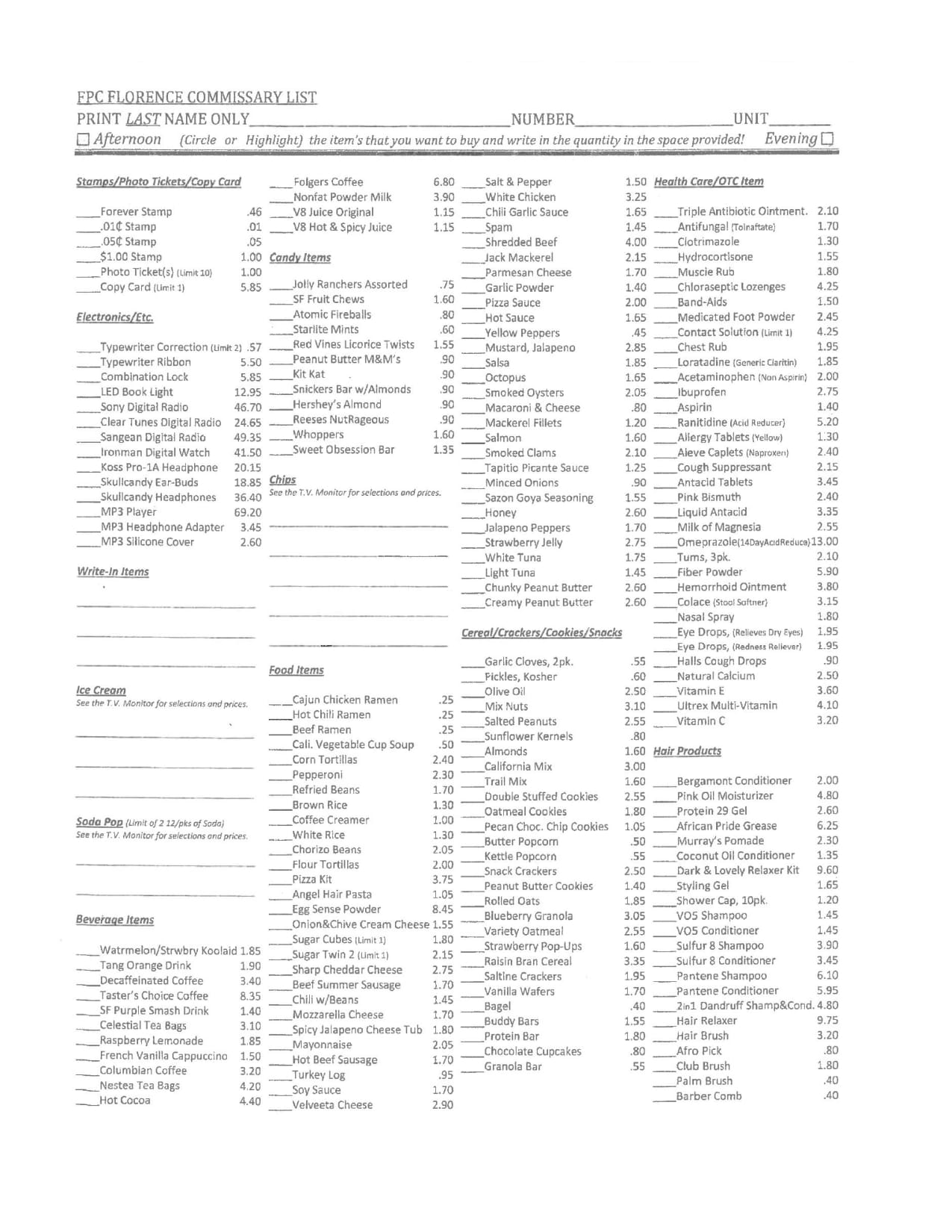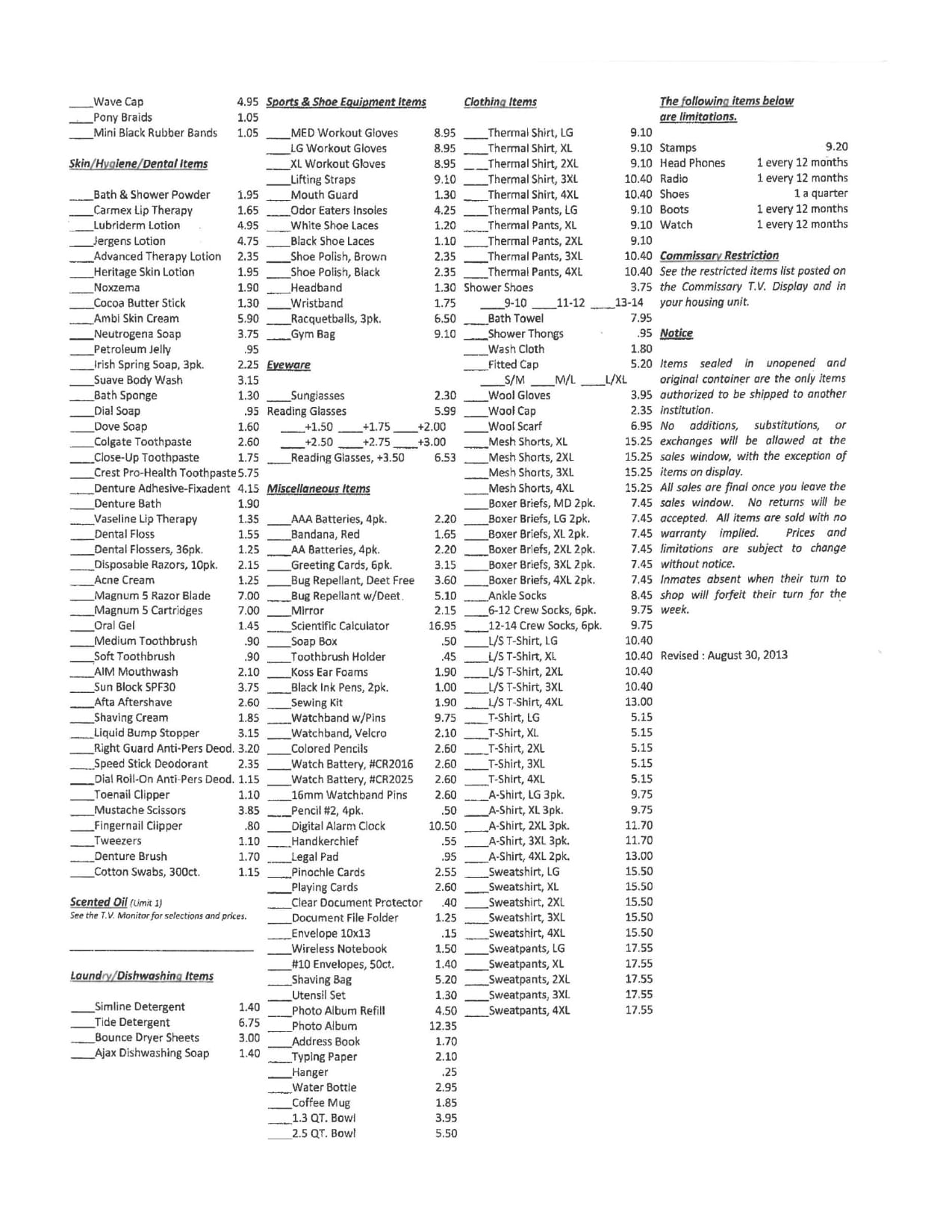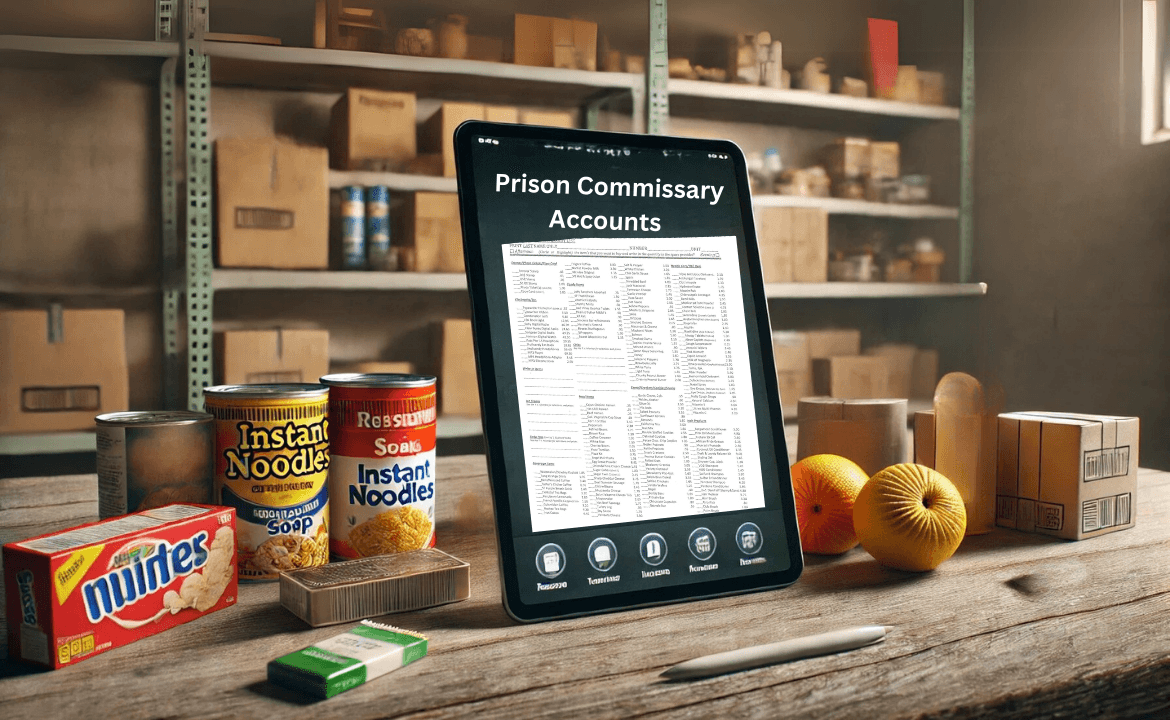Prison Commissary Accounts in the United States are funded by family and close friends of the inmate, which allows them to make purchases of personal items from their commissary account, such as food, snacks, and hygienics such as soap, toothpaste, and shampoo.
About
This article will walk you through the essentials of setting up and funding an inmate’s commissary account while offering valuable advice, clear steps, and a balanced mix of important legal, financial , and wellness aspects of inmate life and for those families and loved ones left behind.
This article will also look at the exploitive aspects of the prison commissary system within the ever-growing prison industrial complex.
Some Prisons Make Their Commissary A Major Profit Center
According to the Fines and Fees Justice Center, prison commissaries are equivalent to mini-marts and offer a variety of items that inmates may purchase, which gives them at least some sense of normalcy.
For prisoners with a funded prison commissary account, visiting the market is the highlight of their week.
However, critics of the prison commissary pricing system claim that their pricing amounts to financial exploitation, and according to major nonprofit Prison Rights Groups like TheAppeal.org, prices can be marked up as much as five times higher than what is available outside the prison walls—sometimes resulting in a markup of 600 percent.
No matter how much a person prepares for prison for the first time, nothing comes close to the actual reality of prison life.
While there are differences between federal and state prisons, both are highly institutionalized and underfunded.
Life within the correctional system comes with frightening and unsettling challenges. For those family members on the outside, making sure their loved one has everything they emotionally and physically need to survive the ordeal becomes one of the most critical challenges they will ever face.
Ensuring that their loved one has access to the essential resources they need to maintain their health becomes a top priority.
Prison commissary accounts play a pivotal role in offering inmates a way to purchase personal items, stay connected to those outside the prison walls, and gain a sense of autonomy.
Most family members left behind, as their loved one serves out their prison sentence, must face the challenge of having to navigate how to support them while also complying with the rules and regulations set out by the prison system.
Most families of prisoners feel overwhelmed by the emotional and financial pressures involved in navigating the system. You’re not alone, and understanding how commissary accounts work can make this journey a little easier.
Legal Tip:
![]()
What is a Prison Commissary Account?
Inmates in US prisons get the basics, like meals, clothes, and hygiene supplies. However, these are limited and will primarily not meet individual preferences or needs. Commissary accounts, also called inmate funds, are like personal bank accounts for inmates where they can buy:
- Snacks and non-perishable food: Instant noodles, chips and candy.
- Hygiene products: Soap, shampoo, toothpaste, deodorant, and feminine hygiene items.
- Stationery: Writing paper, envelopes, and stamps for communication.
- Clothing upgrades: Thermal underwear or better-fitting shoes.
- Recreational items: Books, magazines, or art supplies.
These accounts are funded by commissary deposits from family and friends and through the meager wages earned by inmates from prison jobs.
Financial Tip
![]()
How do Prison Commissary Accounts work?
Creating an account
When an inmate arrives at a prison, they are assigned a commissary account. This account is theirs and is managed by the prison.
- Initial deposit: Any money an inmate has at the time of intake or transfer is put into their commissary account.
- Family deposits: Loved ones can deposit money into the account through online platforms, phone services, or kiosks at the facility.
Trouble Tip
![]()
Making Purchases
Prison facilities provide inmates with commissary lists—catalogs of items available for purchase. Inmates fill out order forms or use approved systems to request items delivered on specific commissary days. (See a sample of a commissary list and order form at the end of this article).
Be mindful that:
- Again, when funding their commissary card, be aware that prices for commissary items are often significantly higher than retail prices outside of prison.
- Certain items may be restricted based on facility policies or an inmate’s disciplinary status.
Account Deductions
Funds in commissary accounts may be subject to mandatory deductions for:
- Restitution fees: Court-ordered payments to victims.
- Medical co-pays: Fees for accessing healthcare services in prison.
- Outstanding fines: Legal fees, court costs, or penalties owed.
If you’re supporting an inmate financially, it’s essential to understand these potential deductions to avoid confusion and the frustration it may cause.
Legal and Financial
Financial transparency and hurdles
Managing commissary accounts can sometimes mean navigating a financial trap:
- High markups: Commissary prices are inflated, so inmates and their families are stretched thin. A single bag of instant noodles that costs $0.25 at the grocery store may cost $1 or more at the prison commissary.
- Predatory deposit fees: Services like JPay and Western Union charge high fees for prison deposits, so it’s more expensive for families to support them.
Trouble Tip News
![]()
Legal recourse for commissary funds
Inmates and their families have limited options but some relief:
- Commissary pricing regulations: Some states cap the markup on commissary items to prevent price gouging.
- Access to funds upon release: When an inmate is released, they get to take any remaining balance in their account.
If you or a loved one has had commissary funds mishandled or unfairly treated, contact a consumer or prison rights attorney.
Action Step: Set a budget for commissary contributions. While it’s natural to want to give as much as possible, overextending yourself can create stress and financial difficulties. Be mindful of the fact you are going through an emotional roller-coaster, so do your best to practice self-compassion.
How to fund a loved one’s commissary account
Know the Facility’s Rules
Each correctional institution operates differently. Familiarize yourself with the rules for:
- Deposit limits
- Approved payment methods
- Commissary schedules
- Planning
Help your loved one make a budget. Encourage them to prioritize necessities like hygiene products or communication tools over items like instant high-sodium noodle soups.
Don’t Over Commit
We want to help, but many families are financially strained supporting an incarcerated loved one. Set a budget for yourself and look into community resources that can help you. If you’re facing homelessness, consider our resource section on how to obtain state and federal assistance.

How To Find Out About The Prisons Specific Commissary Rules
Visit the Prisons: Most facilities provide detailed information about their commissary policies and rules.
Call or Email The Prison Facility: Prison staff can usually provide you guidance of accurate and up-to-date information regarding their commissary rules or refer you to an online prison-approved resource that can.
Review Inmate Handbooks: Many prisons now distribute inmate handbooks or guides that outline rules, including commissary policies.
Contact Prison Advocacy Groups: These are groups that are focused on prison reform or inmate rights and often have resources or contacts that can guide you to the specific commissary rules regarding a particular institution.
Visit Online Prison Forums: Most online prison forums are specifically for families of inmates and can offer valuable information and shared experiences regarding commissary issues.
Ways to Send Commissary Money to an Inmate
There are several methods to send money to an inmate’s commissary account, each varying in cost, speed, and convenience.
Here are the most common options:
Electronic Transfers
Many facilities partner with third-party vendors like JPay, Access Corrections, or Western Union to allow quick electronic transfers. You can use their websites, mobile apps, or kiosks to send funds directly to the inmate’s account. These services are fast but often come with hefty fees, so verify the costs before using them.
Postal Money Orders
Postal money orders are a safe and secure way to deposit funds. Offered by the United States Postal Service (USPS), these money orders are accepted by most facilities.
Make sure the money order is filled out with your loved one’s full name, ID number, and facility address. Keep your receipt as proof of transaction. While postal money orders take longer to process than electronic transfers, they are often much cheaper, so they are a cost-effective option for many families.
Always check with the facility for specific rules and regulations before sending a money order. Keep in mind that not all facilities accept postal money orders.
Facility Deposit Systems
Some correctional facilities provide their own on-site deposit systems, such as lobby kiosks or drop boxes. These systems often accept cash, credit, or debit cards and may process deposits quickly. Check whether this option is available at the prison facility and what fees may apply.
Certified Checks or Bank Drafts
For facilities that allow certified checks or bank drafts, you can visit your bank to issue payment. These options are secure but typically take more time to process compared to electronic transfers.
Third-Party Money Transfer Services
Apart from facility-recommended platforms, additional services may be available for account funding. Choose reputable providers and ensure they are approved by the facility to avoid delays or complications.
Before sending money through any method, always confirm the rules and requirements established by the specific facility where your loved one is located. Proper preparation ensures smoother transactions and helps avoid unnecessary fees or delays.
Emotional impact of managing commissary accounts
For inmates, commissary funds are more than just luxuries. They represent freedom and connection to the outside world. Being able to choose a favorite snack or send a love letter can ease the emotional and psychological pain of incarceration.
For families, depositing into a commissary account is a way to show love. But this can also create its own kind of stress and anxiety, especially if funds are mishandled or if families feel forced to put in more than they can.
Emotional Guilt and Pressure
- Many families feel obligated to provide funds to ensure their loved one’s comfort, even if it’s burdensome and challenging for them to do so.
- If the inmate mismanages funds or makes unnecessary purchases, it can lead to feelings of frustration, anxiety, and resentment.
Action Step: Communicate openly with your loved one. Help them understand your limits and encourage them to prioritize essential purchases. Before doing so, you may want to consult with an online counselor who can help you emotionally prepare for that conversation.

Wellness for Families and Inmates
For Inmates:
- Practice Gratitude: Be thankful for what you get from family.
- Budget Wisely: Use funds to meet your basic needs when ordering from the inmate commissary.
- Stay Active: Use recreational items like art supplies or books to boost mental health and express your love for family members, partners, and close friends.
For Families:
- Set Boundaries: Supporting a loved one is important, but don’t forget to take care of yourself emotionally and financially.
- Join a Support Group: There are good originations like Prison Families Alliance that have resources and can help you find a local prison family support group. Prison Families Alliance is a nonprofit that is committed to improving the lives of families and children of those who have been incarcerated.
- Communicate Honestly: Talk to your incarcerated loved one about spending habits so there’s no confusion and no built-up resentment.
Taking Social Action
Commissary pricing and access are part of the larger prison reform movement. Many believe current practices exploit inmates and their families and disproportionately affect low-income communities.
What can you do?
- Spread the Word: Educate others about the commissary issues.
- Support Reform: Advocate for legislation that caps commissary prices and reduces deposit fees.
- Volunteer with Advocacy Groups: Organizations like the Prison Policy Initiative work to fight for fairness in the system.
Common Misconceptions About Funding Inmate Commissary Accounts
Misconception: Inmates can receive money from anyone.
Reality: Many prisons have strict rules about who can send money, often limiting it to immediate family members or approved contacts.
Misconception: Inmates have unlimited access to their commissary funds.
Reality: Inmates may face restrictions on how much they can spend or withdraw from their commissary accounts, and purchases are subject to prison regulations.
Misconception: Most prisons have the same commissary policies.
Reality: Commissary rules and available items vary widely between facilities, depending on state or local regulations.
Misconception: Inmates can freely share their commissary items with others.
Reality: Many facilities have strict policies against sharing commissary items, and violations can lead to disciplinary actions.
Misconception: All items in the commissary must follow nutritional guidelines.
Reality: Prison commissaries are not health food stores. Most prison commissaries stock highly processed snacks and junk food, which are rarely nutritious.
Misconception: Inmates can check their commissary account balance before entering the commissary
Reality: Accessing one’s prison commissary account information may require requests or may not be readily available, making it difficult for inmates to keep track of their funds.
Video: State Prison Commissary System
Final Thoughts
Funding prison commissary accounts can be financially challenging, but knowing how it works is necessary to support an incarcerated loved one. By combining legal knowledge, financial planning, and wellness practices, you’ll be ready to face these challenges with grace and power.
Remember, you’re not alone, and with the help of community and friendships, you’ll find your way through these challenging times.
Sample Prison Commissary List Order Form:




















